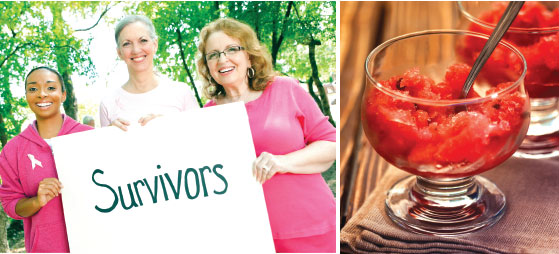Living with or undergoing treatment for breast cancer can prove to be a traumatic time, physically and emotionally. Behnaz Sanjana checked in with Think Pink founder Julie Sprakel to learn how best to cope with a few of the everyday problems associated with the disease and its side effects.
Your Body and Breast Cancer
The common goal for patients and doctors is maximising treatment, minimising side effects and improving the procedure’s outcome. Julie believes that good nutrition is paramount for patients who are ‘immune-suppressed’ following treatment for breast cancer, or any other cancer for that matter. “Good nutrition can really help during treatment. Another important factor is keeping insulin levels under control. This is a supportive mechanism that can boost treatment efficiency and also help to deal with side effects. Simple things like certain herbs and spices can enhance treatment and reduce toxicity. At the same time, one needs to avoid pro-inflammatory foods such as sugars, fast food and aerated beverages, which increase the inflammation in the body,” she says.
It’s a well-known fact that food can start to taste like cardboard during breast cancer treatment. Many women also complain of experiencing ‘aluminum mouth’, an overpowering metallic taste. “Your favourite food can look great but the smell may be too much to handle. The FASS technique can enable you to make your meals palatable and engages you to eat healthily,” explains Julie.
But how does one eat a nutritious diet when one feels a complete lack of appetite, which is common for those receiving any type of breast cancer treatment?

“The best approach for a patient that has a reduced appetite is to graze – there will be days that food doesn’t look appealing,” Julie says. She recommends trying a comforting broth or cool, protein-rich smoothies, as well as freezing a combination of foods in easy-to- use portion sizes, so you can get a variety of necessary nutrients from multiple sources.
“There are many foods that can be used as alternatives to maintain a healthy diet. Eating what you enjoy at a particular time is important. For example, preparing a healthy granita can help relieve mouth ulcers. Sipping on tea can be energising and refreshing. Green tea or ginger tea spritzers or popsicles can combat nausea, which is another common side effect. Remember that the bad taste in your mouth is only temporary.”
Exercise during treatment is something that is not only important for the physical self, but also for mental wellness. Julie assures that simple isometrics or gentle exercise improves overall perspective and attitude. “It has been proven that stress debilitates your immune system, which is something we want to avoid, especially at such a crucial time. Breathe, clear your mind and lower stress by prayer, meditation, yoga or anything that you find soothing. There are many alternative methods that can help you get better; do some research, but rely on correct and evidence-based sources of information. Always check with your doctor before using any alternative methods of healing,” Julie advises.
Your Emotions and Breast Cancer
“I always tell patients that this is a time for you. You need to put yourself first. There will be many people that just want to know what’s going on – they may mean well but you need positivity surrounding you,” says Julie. She suggests putting together a support team to help you cope with all the challenges you may face. “Have one captain and a support crew of caregivers. Delegate duties for transport, shopping, preparation of meals – everyone can contribute, but on your terms,” she says.
Anxiety, depression and fear are common fallouts of hearing a positive cancer diagnosis and while undergoing targeted treatment for it. However, there are various ways in which to better cope with the gamut of emotions.
Research shows that acupuncture boosts the immune system and releases natural painkillers. It may also help to alleviate fatigue, anxiety and nausea. Julie adds that yoga and reiki have shown beneficial support to patients, pre- and post-chemotherapy, although patients must always inform their consultant of any complementary therapies used. A specialised massage can also drain out the lymphatic fluids to prevent or help with lymphedema and Think Pink has supported training for these specialist therapists.
Patients have said that music can be a great mood enhancer. Believe in the power of music and make that playlist of your favourite songs. Communicate your feelings to those close to you or write in a journal as a form of catharsis.
Julie says, “Keep your mind and spirit awake – as individuals we all have different ways of coping. You need to find yours and know that there are people and entities within easy reach, ready to help you through your difficulties. Joining a support group could be of tremendous help.”

Breast Cancer Support Groups in Bahrain
– Bahrain Breast Cancer Society – Arabic
Call 17 233-080 or email [email protected]
– Bahrain Breast Cancer Support Group – English
Call 39 567-322 or check their Facebook page
– Bahrain Breast Cancer Society: Think Pink Bahrain
www.thinkpinkbahrain.com, facebook/thinkpinkbahrain and @thinkpinkbahrain
Call 39 076-717 or email [email protected]





































